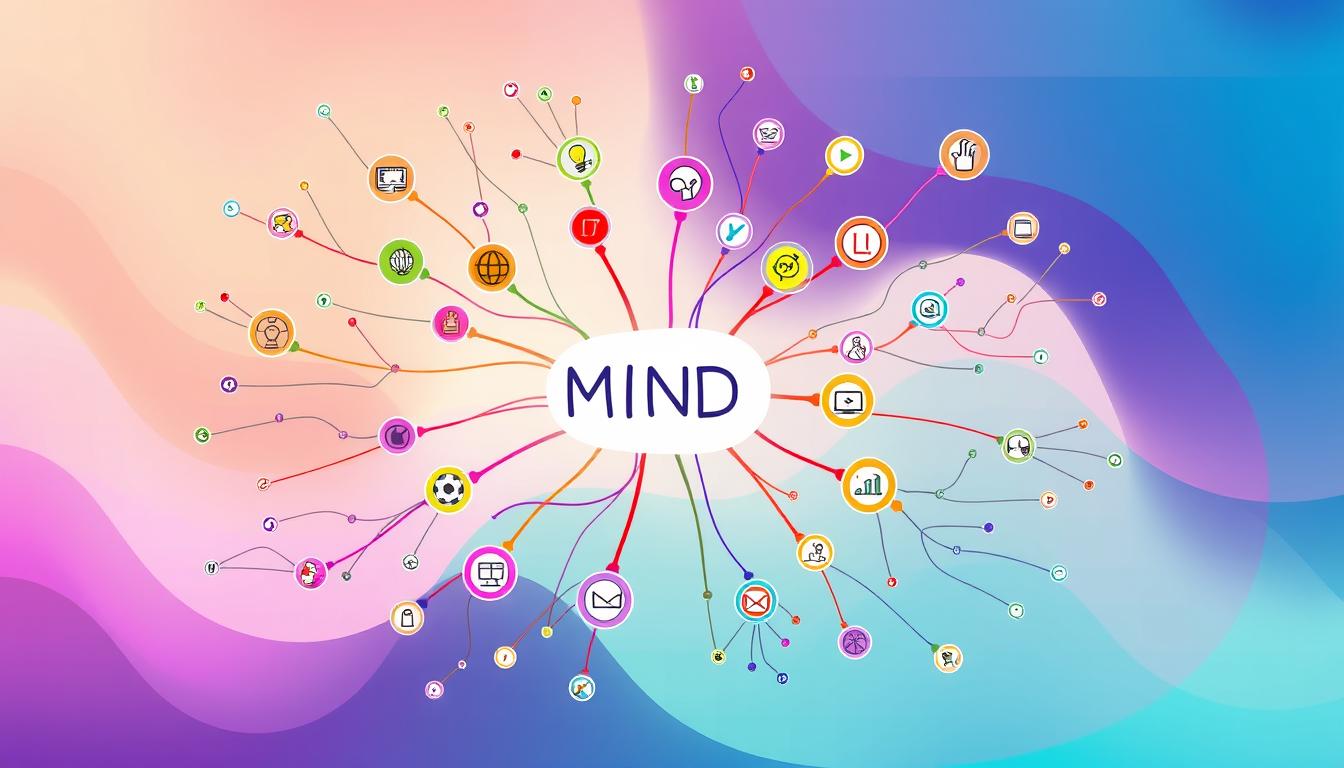Last Updated on December 9, 2025
Journaling is a potent tool for boosting your productivity. It helps clarify your thoughts, enhances self-awareness, and tracks your progress. Studies show that journaling sharpens critical thinking, improves memory, and clears your mind. Psychologist Kelly McGonigal believes that personal writing builds control and emotional strength, crucial in our fast-paced world.
This practice aids in managing time, setting priorities, and handling stress. By incorporating journaling into your routine, you can significantly improve your mental health and reduce stress. It sets you on a path of self-improvement, leading to increased productivity.
Key Takeaways
- Engaging in productivity journaling helps clarify your thoughts and track personal progress.
- Regular journaling can be linked to improved memory retention and academic performance.
- Setting goals through writing can enhance your chances of achieving them.
- Journaling aids in time management, allowing for better prioritization of tasks.
- Reflective writing promotes mental health and reduces stress levels effectively.
Understanding the Concept of Productivity Journaling
Productivity journaling is a powerful tool for self-reflection and accountability, leading to personal growth. By setting aside time to record your daily tasks, feelings, and goals, you unlock numerous benefits.

- Increased productivity through structured planning.
- Reduction in procrastination as you keep track of tasks.
- Decreased stress levels by providing an outlet for your thoughts.
- Improved mood and self-confidence, stemming from regular reflection and monitoring progress.
- Increased chances of goal achievement as you document and visualize your path.
There are various journaling techniques available to enhance your productivity:
- Today and tomorrow: Reflect on the past and plan for the future.
- Self-evaluation and optimization: Analyze your performance and seek improvements.
- Stream of consciousness journal: Write freely to clear your mind and discover insights.
- Goal journal: Document your aspirations and track your progress.
To maximize the benefits of productivity journaling, consider these helpful tips:
- Choose the right type of journal that aligns with your needs.
- Establish a habit of journaling regularly for consistent outcomes.
- Aim for good enough, not perfection, in your entries.
- Analyze your performance to identify patterns and areas of growth.
- Use your journal alongside a to-do list for improved task management.
- Be patient, as achieving substantial productivity improvement takes time.
By engaging in productivity journaling, you encourage deeper thinking and emotional processing. This practice not only improves memory retention but also enhances your critical thinking and decision-making skills.
How Journaling Enhances Time Management
Effective time management is crucial for boosting productivity. Journaling emerges as a key tool, offering deep insights into how you use your time. By documenting your daily activities, you can swiftly pinpoint distractions and inefficiencies that hinder your progress.
Reflecting on your daily achievements helps clarify which tasks are most important. For example, writing down goals can significantly increase your likelihood of achieving them by 42%. This habit fosters a structured method for monitoring your progress, simplifying the identification of tasks that need immediate focus.
Employing productivity tools, such as productivity journals or time trackers, adds a deeper layer of understanding to your daily routines. These tools facilitate a systematic approach to evaluating performance, analyzing productivity patterns, and refining decision-making skills. Many find that this reflection enhances their time management skills, leading to more concentrated and purposeful work hours.
By linking daily concerns to your personal values through journaling, you not only boost your mental health but also improve your self-control. This integrated awareness aids in prioritizing tasks more effectively, allowing you to concentrate on what’s truly important. Thus, journaling evolves into a pivotal habit that propels your journey towards efficiency.
Improving Goal Setting Through Journaling
Journaling is a potent tool for refining your goal setting. By writing down your goals, you significantly enhance your chances of success, with studies showing a 42% increase in achievement rates. Documenting action commitments in a journal clarifies your objectives and maps out clear steps to achieve them.
Research indicates that individuals who write down their goals tend to accomplish more than those who don’t. It’s crucial to set specific, measurable, and challenging goals for better performance. Through regular reflection in your journal, you can articulate your goals more distinctly, turning vague dreams into concrete targets.
Engaging in journaling regularly acts as a catalyst for achievement tracking. It allows you to monitor progress and pinpoint areas for improvement. Those with vividly described goals are 1.2 to 1.4 times more likely to achieve them, underscoring the significance of writing down your aspirations.
Moreover, reflection in your journal encourages introspection on personal hurdles, helping you devise strategies to surmount them. Celebrating milestones in your journal boosts motivation and self-assurance, reinforcing your belief in your abilities. Regular journal sessions for goal check-ins are an excellent way to maintain accountability and stay committed to your progress.
Through consistent tracking of your accomplishments, journaling promotes personal growth by enhancing self-awareness. It helps you identify strengths, weaknesses, and areas for improvement, all while reducing stress. The journal’s spaciousness offers a sanctuary to clear your mind and strategize effectively. Embrace journaling as it illuminates your goals and cultivates your journey to success.
For further tips on overcoming procrastination, explore resources that offer insights into boosting productivity with effective strategies. Discover more here.
Overcoming Procrastination with Productivity Tools
Procrastination can severely impede your productivity. It arises from emotional and psychological hurdles. By identifying these triggers, you can leverage productivity tools to surmount this obstacle. Journaling is a potent tool for delving into the root causes of your procrastination. It helps by shedding light on the fears tied to specific tasks, such as “What am I afraid will happen if I start?” Such introspection uncovers the motivation strategies most effective for you.
Employing a habit tracking system boosts your accountability. Visualizing tasks through simple systems aids in breaking down goals into actionable steps. Focusing on three high-impact actions daily diminishes overwhelm and fosters consistency. Committing just 20 minutes to set up this system, followed by a mere 1 to 10 minutes daily, establishes a sustainable routine aimed at curtailing procrastination.
Moreover, consider how distractions exacerbate your procrastination. Establishing boundaries around social media or other interruptions while working is essential. Enhancing your focus can eliminate obstacles, thereby boosting motivation and enhancing productivity. A structured environment, equipped with the right tools, can counteract avoidance behaviors fueled by fear and anxiety. Adopting a mindset focused on progress rather than perfection can make tasks less intimidating.
Recognize that rest can indeed be productive. Acknowledging the need for breaks is vital for sustained success. By integrating effective motivation techniques with reflective journaling, you can not only defeat procrastination but also achieve your goals with enhanced energy and focus.
Using Habit Trackers to Boost Efficiency
Integrating a habit tracker into your daily life can dramatically boost your efficiency. Research indicates that over 40 percent of our daily actions are habitual. By tracking these habits, you uncover deep insights into your behavior. This knowledge helps you craft routines that align with your productivity aims.
A habit tracker acts as a visual tool, highlighting the daily patterns that lead to your success. You can monitor habits such as regular exercise, daily meditation, or even brief reading sessions. Keeping a record of these habits enhances self-accountability, pushing you to stay true to your goals.
Methods like the “Don’t Break The Chain” method focus on maintaining a consistent routine. This strategy involves marking an “X” on a calendar for each day you fulfill a habit, building a streak that fuels ongoing motivation. The Bullet Journal Method is another powerful tool, blending habit tracking with productivity. It allows you to monitor various aspects, including weight loss or sleep patterns.
- Visual triggers improve your awareness of daily habits.
- Tracking provides instant rewards that boost motivation.
- Maintaining a historical record showcases your growth over time.
With an appropriate habit tracker, you can refine your approach to efficiency. By discerning what works for you and what doesn’t, you can develop habits that propel both your personal and professional achievements.
Benefits of an Organization System with a Daily Planner
A daily planner is key to an effective organization system. It merges with journaling to visually display tasks and goals, boosting clarity. This setup ensures disciplined time use, vital for hitting deadlines.
Studies reveal that handwriting tasks improves memory retention over typing. Users feel a deep sense of accomplishment when they mark off finished tasks. A planner acts as a single spot for tracking daily duties, lowering the risk of missing crucial commitments.
Long-term planners are not just for setting goals but also for monitoring progress. With options like Linen, Leather, and Wellness Planners, finding one that fits your style and needs is straightforward. Prices range from $142.76 for the Linen to $199.96 for the Leather, accommodating various budgets and tastes.
- Physical planners reduce distractions from digital devices.
- Bullet journals divide tasks into smaller, more manageable parts, enhancing productivity.
- With over 1.1 million Full Focus Planners sold, the product has gained a strong following.
Adding a daily planner to your system simplifies task management and boosts reflection on past activities. This reflection is crucial for better time management and effectiveness. By employing productivity strategies that utilize a daily planner, you can accomplish more while keeping a balanced life.

Promoting Self-Improvement through Reflective Writing
Embracing reflective writing is a transformative journey towards self-improvement. It allows you to articulate your thoughts and feelings regarding daily experiences. This fosters opportunities for learning and growth. Studies show that engaging in reflective journaling improves emotional intelligence, sharpens decision-making, and promotes personal development.
By writing about your daily challenges and successes, you enhance your problem-solving skills. This practice also opens avenues for increased self-awareness, a critical component of continuous growth. Here are some benefits of reflective writing that can contribute to your self-improvement:
- Reducing symptoms of depression, anxiety, and stress.
- Boosting feelings of well-being and happiness.
- Identifying patterns in thoughts and behaviors for effective goal-setting.
- Encouraging creativity and imagination as a form of self-expression.
- Increasing motivation and productivity through goal tracking.
Establishing a journaling routine can reinforce these advantages. Reflecting on journal entries enables you to pinpoint areas needing attention. For instance, 75% of individuals found that reflecting on three positive elements each day clarified common themes, guiding personal development. You may notice surprising patterns when considering your reactions to daily events, which can inspire adjustments.
In your journey of self-discovery, recognizing your achievements can boost confidence and motivation, with 80% of participants affirming that acknowledging accomplishments fuels their drive. Additionally, reflecting on challenges helps build resilience and provides valuable insights for the future. As you progress in your reflective practices, remember that the path to continuous growth is nearly always paved with moments of introspection.

How Bullet Journaling Can Streamline Your Tasks
Bullet journaling is not just a fleeting trend; it’s a robust tool aimed at refining your task management and fostering streamlined organization. Its adaptable framework allows you to tailor the system to your unique lifestyle. For newcomers, Ryder Carroll’s video on “How to Bullet Journal” is a fantastic starting point, boasting over 14 million views.
This method champions creativity through customization. Enthusiasts often employ colorful pens, stickers, and brush pens to craft visually engaging layouts. Unlike traditional planners, bullet journaling lets you monitor habits, meals, moods, and budgets in a way that aligns with your style.
To streamline tasks effectively, integrating a daily log and a future log is crucial. These tools facilitate long-term planning. The Reddit bullet journaling community, with over 375,000 members, underscores the method’s popularity among those seeking effective organizational strategies.
- Daily Log: Record real-time events, tasks, and notes.
- Monthly Log: Track short-term tasks and goals.
- Future Log: Plan for several months ahead.
- Index: A roadmap to easily locate journal entries.
- Custom Collections: Tailor your entries to your specific needs.
Using symbols in bullet journaling aids in task prioritization. A bullet (•) denotes tasks, while an asterisk (*) highlights high-priority items. This visual system enhances productivity and turns task management into a fulfilling activity.
By merging bullet journaling with mindfulness, you craft a system that addresses both practical goals and emotional well-being. This holistic approach ensures streamlined organization, balancing daily life demands with personal growth and development.
The Impact of Journaling on Mental Health and Stress Reduction
Journaling is a potent tool for boosting mental health and reducing stress. It offers a means to express thoughts and emotions, serving as a therapeutic outlet. This practice has been shown to lower stress levels and significantly enhance psychological well-being.
Studies reveal that journaling is linked to a notable decrease in negative emotions caused by stress. It promotes mindfulness, deepening your understanding of your feelings. Patients with chronic diseases reported a substantial decrease in stress, with 20% noting a significant improvement after beginning to journal.
- Journaling can improve resilience to stress by increasing the likelihood of seeking social support during challenging times.
- Regular journaling has shown to lower blood pressure and enhance overall mood, with participants feeling an uplift in their emotional well-being.
- Individuals coping with anxiety and depression have found writing about their feelings as a beneficial intervention, leading to 60% of cancer patients reporting reduced symptoms of anxiety and depression.
Writing about the positive aspects of life, such as gratitude, can uplift your mood and foster a more optimistic outlook. For instance, research shows that 45% of individuals with multiple chronic conditions experienced enhanced mental well-being through journaling. This practice bolsters emotional resilience, aiding in the management of stress impacts.

In conclusion, incorporating journaling into your daily life can significantly benefit mental health and stress reduction. This simple yet effective method allows you to navigate emotional complexities while fostering a sense of calm in our fast-paced world. Embracing journaling can lead to significant improvements in emotional well-being and overall life quality.
Conclusion
Reflecting on journaling’s benefits reveals its immense value in boosting productivity and mental health. Regular writing fosters personal growth, leading to new insights and better time management. It not only structures your daily tasks but also cultivates lasting habits.
By incorporating journaling into your daily life, you tackle time management challenges head-on. Whether you opt for a traditional diary or bullet journaling, the essence lies in finding a method that suits you. This approach can transform your life, enhancing both your efficiency and mental clarity.
It’s time to embrace journaling and experience its profound impact. Each entry can improve your productivity and happiness. So, pick up your pen or open your journaling app to embark on a journey of personal growth and fulfillment.








